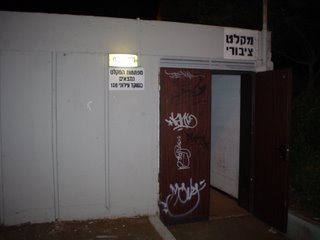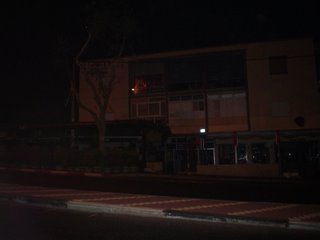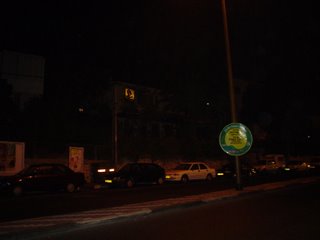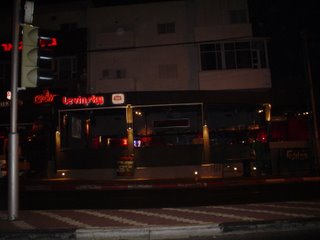 How not to wage this war - right: Israeli children write graffiti on IDF shells
How not to wage this war - right: Israeli children write graffiti on IDF shellsHere's an excellent critique of Israel's missteps in the public relations battle with Hizbullah, written by my friend Uri and edited by his significant other, Tamar, as well as myself.
It is plain to see that the IDF has tactical and military superiority over Hizbullah. Nasrallah is even more aware of it than the Israelis are. In fact, warfare does not take place in the battlefield, using tanks and aircraft, but in the public sphere, where the masses are affected by the media, be it via sound, photographs or videos. In this struggle, achievements are not necessarily measured by actual damage inflicted on each side, but by transforming this damage to catchy simplistic slogans, which can be disseminated quickly to its designated audience.
Since terror leaders are aware of their military inferiority, they ascribe pivotal importance to public affairs and propaganda. This phenomenon can be recognized in almost any Jihad arena. Thus, any “respected” organization runs a professional information desk, which produces audio and video tapes, operates internet sites and forums and of course provides radio and television broadcasting to anyone ready to receive it. Hizbullah for example operates a few internet sites, and runs radio and T.V stations (“Nur” and “Al-Manar” respectively).
When examining records of speeches made by terror leaders it becomes clear that it is frequently directed at the western audience (and the Israelis in Hizbullah’s case). Appeals to this audience aimed at demoralizing civilians and their leadership as well as sowing dissension between them. Much like Ayman Al-Zawahiri who frequently addresses British and American citizens in his speeches, Nasrallah, unfortunately manages to effectively unnerve the Israeli audience. Nasrallah, to some extent, is even admired, rather irrationally, by his Israeli viewers.
Leaders of global Jihad aspire to accomplish their achievements by broadcasting propaganda campaigns to the civilian populations of “crusader states”. Likewise, Nasrallah, by addressing the “Zionist” community, attempts to affect Israeli governmental policy using the public sphere.
Therefore, it is essential to understand that tanks and aircraft, as modern and effective as they might be, will not win this war because the struggle will not end by total destruction of the other side. On the contrary, the “real” points are those obtained in the public affairs’ battlefield (which can be naturally divided to three groups: the Israeli public sphere; the Arab one; and the western-international).
Even if we assume that Israel can effortlessly attain the support (and understanding) of its citizens on the home front, there is no denying the difficulties it faces in the international and Arab public arena. Thus, if the first days of the Israeli operation in Lebanon were accepted by the western world and the international community (and even by great parts of the Arab world) with full understanding, and strict condemnation of Hizbullah for its “adventurous behavior”, now, with every hour that passes, Israel is increasingly being condemned and accused of committing crimes against humanity. The world’s view of Hizbullah clearly remained unchanged from a week ago. But there is a difference - the vast destruction and injuries caused by Hizbullah on the Israeli home front receive less airtime as opposed to the more sensational Beirut bombings. Consequently, Hizbullah is now less condemned, and in the long term, when considering “the day after” the military campaign, Hizbullah will be the first to enjoy its achievements, not within the battlefield itself, but in its vast, well conducted, media production.
To sum up: Israel must first of all realize that failure within the public affairs arena can result in political defeat, regardless of the results of the military campaign. Thus, Israeli official speakers, and in particular army generals, must be professional, eloquent and fluent when making their appearances in the media. At least for now, as one can gather, this is not the case: the generals are hardly capable of saying a single sentence without reading it, and the political leaders (especially Olmert and Peretz), lack confidence, experience and charisma (I cannot recall other Israeli leaders that match their poor performance). Second, while we cannot prevent the media from publishing photographs of bombed out Lebanese neighborhoods, Israel owes it to itself to do everything in its power to control the visual content that it releases to the media, especially the foreign networks. Failures in the battle for public opinion must be viewed with the same gravity as military setbacks. The recent release to the foreign media of photographs of Israeli children “decorating” IDF artillery shells is no less deplorable than the intelligence failure that resulted in the near-sinking of the Israeli naval warship off the coast of Beirut. Pictures of this nature serve as a welcome weapon in the arsenals of hostile bloggers Hizbullah’s propagandists, by devastating Israel’s image abroad. What the IDF was thinking when it permitted these children on the grounds of a closed military base, and why the IDF Spokesperson authorized the release of these scandalous photographs is beyond comprehension. For now, Hizbullah can chalk up another victory on the narrative-building battlefield. In the long run, it is clumsy displays of IDF incompetence in the public relations battle of this sort that will allow Hizbullah to emerge victorious, regardless of the warfare’s actual outcome.






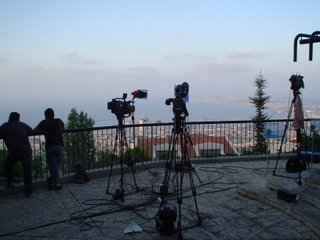
 Now we're back at home, watching news again. I'm very sad for all the civilians, Lebanese and Israeli, who are continually being affected by this conflict.
Now we're back at home, watching news again. I'm very sad for all the civilians, Lebanese and Israeli, who are continually being affected by this conflict.


